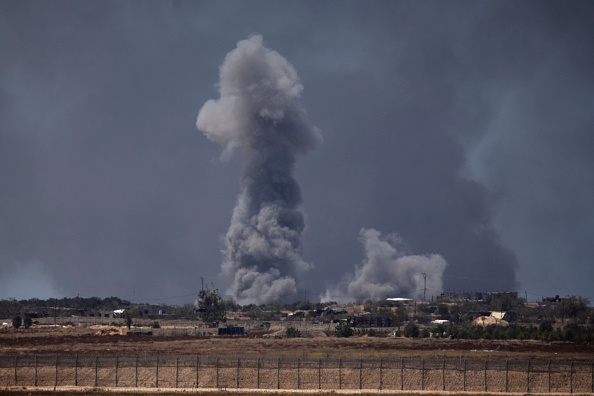Israel launched a major military operation in Rafah in southern Gaza even though Hamas accepted a proposed ceasefire brokered by Qatar and Egypt.
The attacks come as the US revealed that it paused a bomb shipment to Israel last week over concerns about an attack on Rafah.
Even though the International community and the US have warned it not to attack Rafah, Israeli tanks and armoured vehicles rolled into the crucial border crossing with Egypt on Tuesday.
Israel made its move after rejecting a proposed ceasefire deal that Hamas accepted.
While the White House has sought to downplay the invasion as a “limited operation”, there are growing fears that Israel’s assault could dramatically escalate.
The UN and aid agencies have issued urgent warnings about the dire famine conditions in Gaza.
An International Committee of the Red Cross spokesperson warned it will be forced to halt its operations if Israel’s military assault on Rafah continues.
“Our operations despite the challenges continue in Rafah and in the middle area,” Hisham Mhanna told Al Jazeera from Rafah.
Thousands of Palestinian civilians are fleeing Rafah and pouring into central Gaza after Israel’s seizure.
The largest hospital in Rafah has ceased operations and WHO says the remaining clinics have just three days worth of fuel left.
Israel claims it is targeting Hamas but it launched the attack despite the US saying it had not seen any credible assessment of how Israel will minimise harm to civilians.
Israel rejects ceasefire
Israeli Prime Minister Benjamin Netanyahu rejected the ceasefire proposal accepted by Hamas, claiming it falls short of its demands, Reuters reported on Tuesday.
The comments come despite reports that the agreement approved by Hamas is nearly identical to the Egyptian-brokered proposal Israel had previously agreed to, according to Haaretz.
At a press conference in Beirut, Hamas official Osama Hamdan warned that continued Israeli attacks in Rafah would scuttle any ceasefire deal, according to Reuters.
Israel’s dismissal of the agreements contradicts recent pressure from the Biden administration, which had urged the Palestinian group to accept the ceasefire deal.
“There’s no time for further haggling. The deal is there,” Secretary of State Antony Blinken said on May 1st, adding that Israel had made “very important” compromises and the onus was on Hamas.
After Hamas accepted the proposal on Monday, the United Nations and several regional countries welcomed the decision and called on Israel to reciprocate by halting the fighting.
US arms shipment on hold
On Wednesday, US Defense Secretary Lloyd Austin revealed that the US paused a weapons transfer to Israel amid concerns over its military invasion of Rafah in Gaza.
Testifying before Congress, Austin said the administration paused “one shipment of high payload munitions.”
“We’ve been very clear … from the very beginning that Israel shouldn’t launch a major attack into Rafah without accounting for and protecting the civilians that are in that battlespace,” Austin told US lawmakers.
“We’ve not made a final determination on how to proceed with that shipment [of weapons].
“My final comment is that we are absolutely committed to continuing to support Israel in its right to defend itself.”
The arms shipment pause drew criticism from Israel’s UN ambassador but was welcomed by Senator Bernie Sanders as “a first step.”
“The US must now use ALL its leverage to demand an immediate ceasefire, the end of the attacks on Rafah, and the immediate delivery of massive amounts of humanitarian aid to people living in desperation,” Sanders said in a statement.
“Our leverage is clear. Over the years, the United States has provided tens of billions of dollars in military aid to Israel.”


















